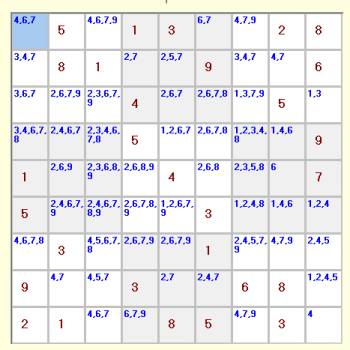What's New - April, 2012
[Home]
April 7, 2012:
 |
|
Hints optionally displayed in blue |
Here is the first (incomplete) version of a Sudoku Helper/Solver. I wrote it on our Caribbean cruise last week while the rest of the family worked on solving the daily puzzles handed out by the cruise line. My way is harder initially, but when they solve one, they have solved one; when I solve one, I have, in theory, solved them all! (That excludes the possibility of program bugs of course, but even those are new and non-repetitive problems to solve one-time. I love it!)
The program allows entering and saving puzzles. As you run
across those that cause problems, save and send them on as email attachments to
feedback@delphiforfun.org.
Pace yourself and only send one per week please (in case the 6 included samples
are the only ones the program can solve).
April 8:2012: It didn't take long to find the first couple of program bugs in yesterday's posting: Sudoku Helper/Solver V 1.2 was posted today to fix problems with missing default file extensions on saved puzzles and the missing final hint value when hints extended onto a second display line.
April 11, 2012: Sudoku Version 1.3 corrects a problem with the Undo button trying, under some conditions, to Undo more moves than were made resulting in various undesirable outcomes.
April 13, 2012: Sudoku Version 2.0 was posted today. It adds the "Trail and Error" solver discussed. earlier and cleans up a couple of other minor bugs. We'll let it rest for a while now as I move on the the next project.
April 21, 2012: Here's a program, DSTCalc, investigating how Daylight Saving Time start and end dates can be calculated using simple equations without resorting to high level date-time routines. This might be useful for programmable devices which need to know but don't have the advantages that the big boys have. The program also contains a Delphi GetNthSunday function using the high level routines to verify the simple equation approach.
April 28, 2012: "Points from 4 Sensors" is a program which calculates the location of a target in 3D space when it is given the locations of 4 sensors and the distance from each sensor to the target as they (or the target) calculates. The program completes the picture by calculating the (x, y, z) coordinates of the target using a method called Gaussian Elimination to solve the 4 distance equations. Point from 4 Sensors, Version 5.0 posted today adds an alternative technique, Trilateration, to find target coordinates. Trilateration appears to be more robust, finding solutions when the sensors are coplanar or nearly coplanar and the Gaussian method fails.
